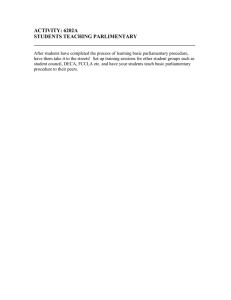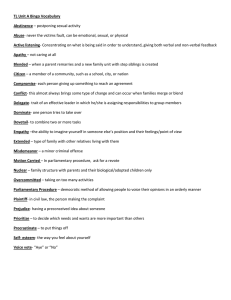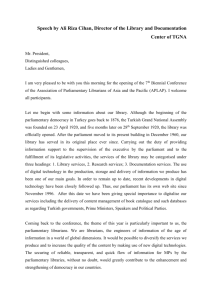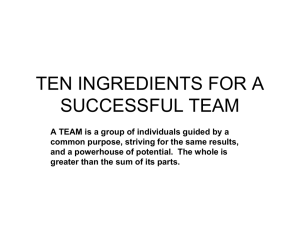CHECK AGAINST DELIVERY Busan, 1 December 2011
advertisement
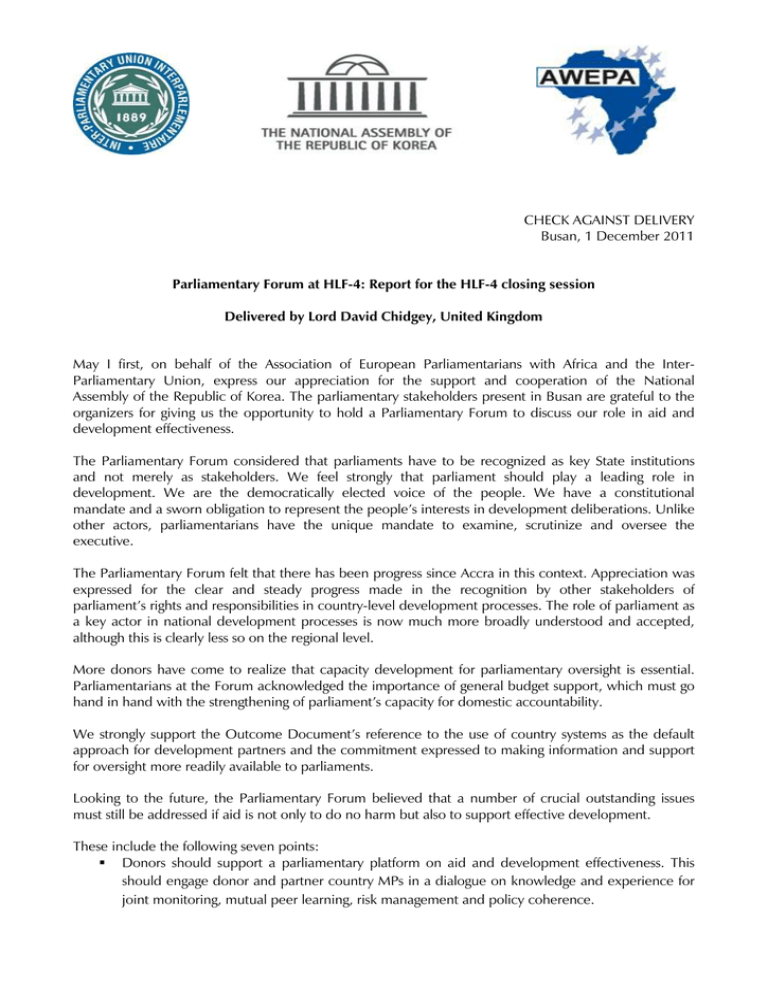
CHECK AGAINST DELIVERY Busan, 1 December 2011 Parliamentary Forum at HLF-4: Report for the HLF-4 closing session Delivered by Lord David Chidgey, United Kingdom May I first, on behalf of the Association of European Parliamentarians with Africa and the InterParliamentary Union, express our appreciation for the support and cooperation of the National Assembly of the Republic of Korea. The parliamentary stakeholders present in Busan are grateful to the organizers for giving us the opportunity to hold a Parliamentary Forum to discuss our role in aid and development effectiveness. The Parliamentary Forum considered that parliaments have to be recognized as key State institutions and not merely as stakeholders. We feel strongly that parliament should play a leading role in development. We are the democratically elected voice of the people. We have a constitutional mandate and a sworn obligation to represent the people’s interests in development deliberations. Unlike other actors, parliamentarians have the unique mandate to examine, scrutinize and oversee the executive. The Parliamentary Forum felt that there has been progress since Accra in this context. Appreciation was expressed for the clear and steady progress made in the recognition by other stakeholders of parliament’s rights and responsibilities in country-level development processes. The role of parliament as a key actor in national development processes is now much more broadly understood and accepted, although this is clearly less so on the regional level. More donors have come to realize that capacity development for parliamentary oversight is essential. Parliamentarians at the Forum acknowledged the importance of general budget support, which must go hand in hand with the strengthening of parliament’s capacity for domestic accountability. We strongly support the Outcome Document’s reference to the use of country systems as the default approach for development partners and the commitment expressed to making information and support for oversight more readily available to parliaments. Looking to the future, the Parliamentary Forum believed that a number of crucial outstanding issues must still be addressed if aid is not only to do no harm but also to support effective development. These include the following seven points: Donors should support a parliamentary platform on aid and development effectiveness. This should engage donor and partner country MPs in a dialogue on knowledge and experience for joint monitoring, mutual peer learning, risk management and policy coherence. All stakeholders should recognize that effective institutions and policies must start with a separation of powers in order to prevent abuse. They would need to establish a monitoring indicator for parliament’s competence in and performance on aid, among those to be agreed by June 2012. Participants also called for parliamentary involvement in the shaping and negotiation of aid contracts and programmes. Donor and partner governments can accelerate gender equality and women’s empowerment by recognizing that women parliamentarians are an untapped resource, and by prioritizing an increase in resources to strengthen their skills and networking opportunities. With regard to South-South and triangular cooperation, donors should also prioritize capacity support for regional parliamentary bodies to carry out oversight of regional development resource budgets and expenditures. This should include support for opportunities for SouthSouth parliamentary knowledge-exchange networks and peer learning. Parliament should provide the meeting point for civil society, the private sector and local government dialogue on initiatives as diverse as combating corruption or climate change. Donor programmes for fragile States and those in situations of conflict should recognize the special needs of their parliamentarians, engage with them on current and future programmes, and encourage dialogue with MPs in similar situations. A reporting requirement should be created for off-budget NGO-funded development projects so that parliamentary oversight is informed and the lack of transparency addressed by the relevant donor and partner country parliamentary committees. Parliamentarians have witnessed a steep learning curve within the Working Party on Aid Effectiveness as it struggled to come to grips with a parliamentary presence in its midst. The parliamentary voice was hampered by structural constraints, such as not being a member of the WP-EFF Executive Committee and not being represented on the HLF-4 Outcome Document drafting committee. With regard to the future Global Partnership for Effective Development Cooperation, the Parliamentary Forum felt strongly that the time has come for the inclusion of parliamentarians in any post-Busan central coordination structures. Discussions should be pursued on how to better involve parliamentarians in future processes.
